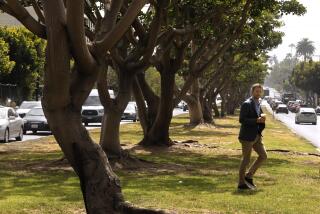Drought Cops Patrol Streets of Santa Barbara
- Share via
SANTA BARBARA — The chief of the drought police was on patrol in the streets of west Santa Barbara when he spotted his first clue: water in the gutter. He pulled over, studied the flow for a moment and then examined a nearby lawn.
“There’s evidence all over the place,” said drought officer Mike Morales as he ran a hand over the damp lawn and examined a still-wet sprinkler head. “This is flagrant.”
Morales is the head of a three-person staff created by the city of Santa Barbara to enforce its harsh new water conservation measures. Faced with a water shortage of almost 50% this year because of the ongoing drought, the City Council earlier this week voted to make watering lawns illegal. The ordinance also prohibits residents from using hoses to water trees and shrubs.
Morales and the two other drought officers patrol the city streets, looking for telltale signs like wet gutters and puddles on the sidewalk. They also respond to calls. So far, The officers have received about 30 calls a day, mostly from residents who have spotted neighbors watering their lawns.
“We don’t consider the number of calls to be particularly high . . . mainly because the ban was only recently announced,” Morales said. “Overall, we feel most people are complying with the order.”
After studying the front lawn of the west Santa Barbara house with the wet gutters, he spotted the culprit in the back yard. Morales introduced himself and informed the man that watering lawns is now prohibited in the city.
Norman Lang, the homeowner, shrugged sheepishly. He knew about the water restrictions, he said, but he had just put in a new lawn and sprinkler system.
“I figured I’d water one last time and hope for rain,” Lang said. He gazed at his lawn wistfully. “But the lawn will probably die anyway. And all that time and money I put into it will be wasted.”
Lang got off easy this time--only a verbal warning. But the city soon will start issuing citations to transgressors, said Bill Ferguson, Santa Barbara’s water development planner. A warning citation will be issued for the first offense; second and third offenses could result in fines and a fourth violation could lead to shut-off of a resident’s water service.
“Unless we get some incredible rainstorms, the watering ban will be in effect for at least the coming year,” Ferguson said.
Morales, 54, was hired by the city last month to enforce a number of water conservation measures. He drives around town in a white pickup truck with “Drought Officer” stenciled on the door, along with the city seal.
When Morales began his day Thursday, he had a list of homes to check out. During the night, about 10 residents had called a city hot line to report violators.
“We don’t look at it as snitching,” Morales said. “We’re all in this drought together. And if we didn’t get the cooperation of people, we’d need a lot more officers and a lot more water would be wasted.”
Responding to one tip, Morales arrived at a group of condominiums in the city’s eastern foothills. A neighbor was waiting out in front, drinking coffee and smoking a cigarette. He pointed out to Morales a wet lawn, puddles on the sidewalk and a broken sprinkler head. Morales promised to obtain the names of all the condominium owners and remind them of the watering ban.
During the course of his morning patrol, no residents openly resisted Morales or expressed hostility. Most listened to what he had to say and nodded wearily.
But some, even in the face of overwhelming evidence, refuse to admit culpability. One man, whose lawn had been watered during the night, opened the door in his bathrobe and told Morales: “The gardener must have done it.”
Later, Morales spotted a trail of water flowing through the gutters. He drove slowly for several blocks, following the stream, until he located the source: a small tract home. The lawn was drenched.
When Morales confronted a woman at the front door, she stared at him wide-eyed and declared: “I haven’t watered any lawn.”
Problems like these will soon be solved, Morales said, when a drought officer is assigned to the night shift and can catch scofflaws in the act.
Morales, who used to own a small energy conservation firm, knows that his job security is tied to the city’s current bad fortune. Santa Barbara is entering its customary dry season, so he is virtually assured of employment through the end of summer.
“But after the next good rain,” Morales said, “I know I could be gone.”
More to Read
Sign up for Essential California
The most important California stories and recommendations in your inbox every morning.
You may occasionally receive promotional content from the Los Angeles Times.













